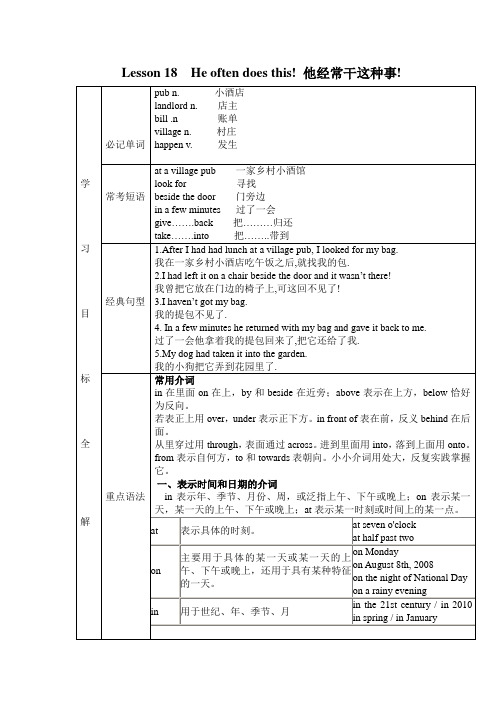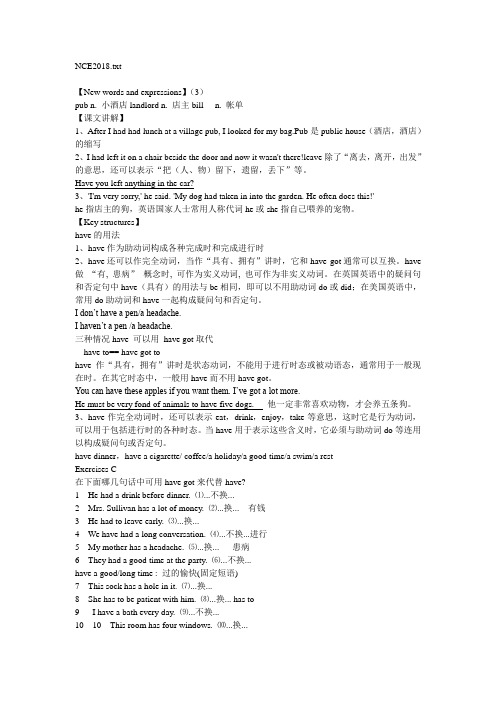新概念英语第二册第18课重点语法句型
新概念第二册第18课

【Text】My aunt Jennifer is an actress. She must be at least thirty-five years old. In spite of this, she often appears on the stage as a young girl. Jennifer will have to take part in a new play soon. This time, she will be a girl of seventeen. In the play, she must appear in a bright red dress and long black stockings. Last year in another play, he had to wear short socks and a bright, orange-coloured dress. If anyone ever asks her how old she is, she always answers, 'Darling, it must be terrible to be grown up!'课文讲解1、My aunt Jennifer is an actress.以-ess结尾的是女性;以-or、-er 结尾的是男性actor 男演员;actress 女演员:waiter 男服务员;waitress 女服务员prince 王子;princess 公主lion 公狮子;lioness 母狮子doctor 男医生;woman doctor 女医生god 神;goddess 女神(God 上帝,注意“G” 大写)2、She must be at least thirty-five years old.年龄的两种表示方法:①数字+years old,作表语thirty-five years old 三十五岁②数字+-year-old,作定语my four-year-old daughtermust + 动词原形不得不, 必须;(对现在的)推测She must be a model.She is fifteen years old. 她五岁了She must be fifteen years old. 她很可能五岁She must be at most fifteen years old. 她最多十五岁She must be at least fifteen years old. 她至少十五岁at least 至少, 最少If you can’t clean the car, you can at least help me to clean it.at most 最多3、In spite of this, she often appears on the stage as a young girl.in spite of 不管,尽管(“of” 为介词, 后面一定会加名词、代词或从句)in spite of this 尽管如此In spite of this, I still like school.Despite 尽管作介词与in spite of一样(school 前不加“the”表示上学,加“the”只表示学校)In spite of what you have said about her, she is much better than Mary.4、Jennifer will have to take part in a new play soon.join 参加了某一种团体join sb./sth.join the army 参军join the party 入党join us (口语)加入我们(这个团体)中来take part in 参加某一种活动take part in the race 参加比赛take part in a playtake part in the partyattend 出席attend the meeting 参加会议, 出席会议attend the party 出席宴会attend the class 上课Thank you for your attending. 谢谢大家的出席(到来)Thank you for your listening. 谢谢大家的听讲5、This time, she will be a girl of seventeen.两种年龄的表达:She is eighteen years old.She is a girl of eighteen. = She is an eighteen-year-old girl .6、In the play, she must appear in a bright red dress and long black stockings.in (+颜色、衣服) 穿着……样的衣服,用介词短语取代动词,避免了一句话中出现两个动词The boy in green.in a bright red dress 鲜红色的连衣裙bright,orange-coloured dress 鲜艳的桔黄色衣服7、If anyone ever asks her how old she is, she always answers, 'Darling, it must be terrible to be grown up!'ever = at any time 任何时候(时间副词)it must be 一定……(表示推测)grown-up adj. 成年人be grown-up 作为一个成年人grow up (人)成长当有人问你年龄时,你可以这样回答:It is a secret. / It is privacy.I forget it.As的用法as 作为连词,其意义和用法主要有:1 意为“当……之时”,引导时间状语从句,在意思上相当于when 和while 引导的时间状语从句。
新概念二Lesson 18 知识点整理

We are below the moon.
三、表示延续时间的介词
by意为“在……之前;不迟于……”;for意为“历时……之久;持续……”;in意为“在……以后;在……时间内”;since意为“自从……以来;自……以后”;until用于否定句中,意为“直到……才”,其前的谓语动词多为非延续性动词,用在肯定句中,意为“直到……为止”,其前谓语动词须用延续性动词。如:
他已经当老师9年了。He has been a teacher ________ nine years.
我已经在这儿住了10年了。I have lived here ________ ten years ago.
他十分钟之后将会回来。He will be back ________ ten minutes.
Lesson 18 He often does this!他经常干这种事!
学
习
目
标
全
解
必记单词
pub n.小酒店
landlord n.店主
bill .n账单
village n.村庄
happen v.发生
常考短语
at a village pub一家乡村小酒馆
look for寻找
beside the door门旁边
知道五月,我们才会看到一些花。We don’t see any flowers ________ May.
你必须得在这里站到太阳落下去为止。You must stand here ________ the sun sets.
我明天早晨八点前必须得到校。I must be at school ________ eight tomorrow morning.
逐句精讲新概念英语第二册:第18课他经常干这种事!

Lesson18 He often does this 课⽂内容: After I had had lunch at a village inn, I looked for my bag. I had left it on a chair beside the door and now it wasn't there ! As I was looking for it, the inn-keeper came in. ‘Did you have a good meal ' he asked. ‘Yes, thank you,' I answered, ‘but I can't pay the bill. I haven't got my bag.' The inn-keeper smiled and immediately went out. In a few minutes he returned with my bag and gave it back to me. ‘I'm very sorry,' he said ' My dog had taken it into the garden. He often does this.' 本⽂语法:have的时态和变化 语法归纳:have作实义动词意为“拥有”,作助动词帮助构成完成时态。
1)作实义动词,意为“拥有”(=own, possess,have got): I have over a thousand books. = I own / possess over a thousand books 我有1000 多本书。
Did you have plenty of time to see your mother?你有⾜够的时间去看望你母亲吗? Have you got any views about this new plan?对于这个新计划你有何看法?(在英式⼝语中常⽤ have got代替have。
新概念英语第二册课堂笔记Lesson18

NCE2018.txt【New words and expressions】(3)pub n. 小酒店landlord n. 店主bill n. 帐单【课文讲解】1、After I had had lunch at a village pub, I looked for my bag.Pub是public house(酒店,酒店)的缩写2、I had left it on a chair beside the door and now it wasn't there!leave除了“离去,离开,出发”的意思,还可以表示“把(人、物)留下,遗留,丢下”等。
Have you left anything in the car?3、'I'm very sorry,' he said. 'My dog had taken in into the garden. He often does this!'he指店主的狗,英语国家人士常用人称代词he或she指自己喂养的宠物。
【Key structures】have的用法1、have作为助动词构成各种完成时和完成进行时2、have还可以作完全动词,当作“具有、拥有”讲时,它和have got通常可以互换。
have 做“有, 患病”概念时, 可作为实义动词, 也可作为非实义动词。
在英国英语中的疑问句和否定句中have(具有)的用法与be相同,即可以不用助动词do或did;在美国英语中,常用do助动词和have一起构成疑问句和否定句。
I don’t have a pen/a headache.I haven’t a pen /a headache.三种情况have 可以用have got取代have to== have got tohave作“具有,拥有”讲时是状态动词,不能用于进行时态或被动语态,通常用于一般现在时。
新概念第二册Lesson 18 He often does this

2、I had left it on a chair beside the door and now it wasn't there?
→e.g.: He left a note on the door .
→e.g.: I think I must have left the key in the room. beside/ besides/ except beside 在...旁边 beside the door/ window / car /lake besides (除了...外包括)包括... He can speak many languages besides English except 除了... Every student came to the party except Tom.
3、What had happened to your handbag?
Questions on the text
1、Where did you leave her handbag? She left her handbag on the chair beside the door. 2、Why couldn't you pay the bill ?
look for
&
find
→I was looking for the map for half an hour and finnally I found it. look for find 找的动作 找的结果
Yesterday I was my lost keys, but I have not them now.
Let’s play a guessing game.(animal) 1.It runs very fast, people used it as a traffic tool In the old days.
新概念英语第二册:第18课课文详解及语法解析

新概念英语第二册:第18课课文详解及语法解析课文详注 Further notes on the text1.After I had had lunch at a village pub, I looked for my bag.我在一家乡村小酒店吃过午饭后,就找我的提包。
(1)have在have lunch这个词组中是完全动词而不是助动词,所以,像其他完全动词一样,它的过去完成时要加助动词had。
(cf. 本课语法)(2)pub为public house(酒店,酒吧)的缩略形式,在英国英语的口语中较常见:Let's go to the pub for a drink.咱们去酒店喝杯酒吧。
(3)look for强调“寻找”这个动作,而不涉及结果:I looked for my key everywhere, but I couldn't find it.我到处寻找我的钥匙,但还是没找到。
2.I had left it on a chair beside the doo r…我曾把它放在门边的椅子上……leave除了“离去”、“离开”、“出发”的意思,还能够表示“把(人、物)留下”、“遗留”、“丢下”等:The dog has left your bag by a tree.那狗把你的提包丢在了一棵树旁。
Have you left anything in the car?你有没有把什么东西丢在车里?Leave the books on the desk.把书放在课桌上。
3.My dog had taken it into the garden. He often doesthis!我的狗把它弄到花园里去了,他常干这种事!he在这里指代的是狗。
动物通常用it来代表,即被看成像东西一样。
但是,指宠物、家畜或民间故事中的动物时,我们经常也用he,she,who等,即使得它们“人格化”并具有性别。
新概念英语第2册课程讲义Lesson18
Lesson18单词讲解ndlord n.店主,房东,业主,老板landowner n.2.bill n.账单,单据,清单/钞票/法案/广告pay the billUS dollar billsa crime billa bill boardLesson18课文&语法讲解本课重点:have的用法实义动词助动词have的用法实义动词1.“有”2.“吃喝玩乐做”助动词have的用法实义动词1.“有”I have a book.She has a car.He had a surprise.2.“吃喝玩乐做”have a meal have breakfast have some water have fun have a good timehave a swimhave的用法实义动词助动词(完成时态中)I have received a letter.She has bought a gift.He had left.have的用法(用法不同,变否定疑问也不同)实义动词助动词(完成时态中)I have received a letter.I have not received a letter.She has bought a gift.She has not bought a gift.He had left.He had not left.have的用法(用法不同,变否定疑问也不同)实义动词I have a book.I do not have a book. She has lunch.She does not have lunch. He had a good time.He did not have a good time.助动词(完成时态中)have的用法(用法不同,变否定疑问也不同)实义动词I have a book.I do not have a book. She has lunch.She does not have lunch. He had a good time.He did not have a good time.助动词(完成时态中)I have received a letter.I have not received a letter.She has bought a gift.She has not bought a gift.He had left.He had not left.have的用法练习:(判断用法,并变否定疑问)1.You have a lot of money.2.They had a swim yesterday.3.She has eaten breakfast.4.My dog had taken it into the garden.have的用法练习:(判断用法,并变否定疑问)1.You have a lot of money.2.They had a swim yesterday.3.She has eaten breakfast.4.My dog had taken it into the garden.have的用法练习:(判断用法,并变否定疑问)1.You have a lot of money.You do not have a lot of money.2.They had a swim yesterday.They did not have a swim yesterday.3.She has eaten breakfast.She has not eaten breakfast.4.My dog had taken it into the garden.My dog had not taken it into the garden.have的用法补充两点:“有”have=have got实义动词助动词You have a lot of money.=You have got a lot of money.do not have have not got have的用法补充两点:1.“有”have=have got2.have/has had had hadI had had lunch at a village.We have had trouble with the plan.It has had no effect.1.After I had had lunch…,I looked for my bag.have的过去完成时一般过去时先后2.I had left it on a chair beside the door and now it wasn’t there!beside the doorBesides this book,I have some others.3.As I was looking for it,the landlord came in.4.“Did you have a good meal?”he asked.5.“but I can’t pay the bill.I haven’t got my bag.”6.My dog had taken it into the garden.本课重点:have的用法实义动词助动词Lesson18知识拓展本课重点:if真实条件句(假设将来)Lesson18知识拓展本课重点:have的用法实义动词助动词have的用法实义动词“有”“吃喝玩乐做”助动词(完成时态中)have的用法He had a smoke after dinner.My friend Bill has had a headache.have的用法Their guest room has two big windows.We had had a long vacation after that.本课重点:have的用法实义动词助动词。
新概念英语第二册课件Lesson18(共14页)
New words and expressions
public house 我们去酒吧喝一杯吧!
Let’s go to the pub for a drink!
landlord ['lændlɔ:d] n. 店主,地主
3. She couldn't pay the bill. 4. The landlord soon found it for her. 5. His dog had taken it into the garden.
1. What happened to the bag?
writer’s
After I had had lunch at a village pub, I looked for my bag.
1. look for 寻找 look after =
take care of 照看 照顾 look out
我要当地主!
I want to become a landlord !
bill [bil] n. 账单,比尔
比尔会替我买单的。 Bill will pay the bill for me.
What do you keep as a pet?
•
Dogs
•
listen to the tape and answer the question:
7. give back归还 give 用法(难点P82) give in 上交,呈交 屈服,让步,投降 gave away 赠送
give up doing sth. 放弃,抛弃 give up 交出,让出
'I'm very sorry,' he said. 'My dog had taken it in into the garden. He often
新概念第二册Lesson18笔记整理
Lesson 18 He often does this!一、Grammar:have用法Have:助动词:构成各种完成时(现在、过去、将来)和完成进行时;have/has done; had done; will/shall done实义动词:1、表示“具有”、“拥有”时为状态动词,与have got可互换,一般不用于进行时或被动语态。
2、表示eat、drink、enjoy、take等意思时,可用于各种时态。
Eg:have lunch;have a cup of coffee;have a good time;have a bath对以上各种完成时举例:现在完成时:He has just gone to Beijing.过去完成时:The film had begun before we got to the cinema.将来完成时:By the time you get home I will have cleaned the house from top to bottom. (注:将来完成时表示将来某一时间以前已经完成的动作,并对将来产生影响。
一般它的时间状语为:before/by+将来时间;by the time引导从句)二、课文语言点:1、look for:表示动作,不涉及结果;find:表示结果2、leave:1)离开:leave for+地点:动身去某地;leave+地点+for+地点:离开某地去某地2)遗弃: Her husband has left her. 她的丈夫把她遗弃了。
3)遗忘,丢下:I left my keys at home.4)留给,遗留:The famous actress left all her money to charity.(慈善机构)5)让某物处于某种状态:He left the window open. 他让窗户开着。
3、beside:只作介词,“在旁边”=next to(旁边,紧挨着)Eg:There is a boy beside near the door. 有个男孩在门的旁边。
新概念英语第二册lesson 18
在英国英语中的疑问句和否定句中have的用法与be相同, 即可以不用助动词do或did;在美国英语中,常用do助 动词和have一起构成疑问句和否定句。 I don’t have a pen.= I haven’t a pen.
③
have 作完全动词时,还可以表示eat, drink, enjoy, take等意思,这时它是行为动词,可以 用于包括进行时的各种时态。当have用于表示 这些含义时,它必须与助动词do等连用以构成 疑问句或否定句。
Jack has given up the watch he stole last week.
Beside VS. Besides
Beside 介词,在…旁边 Besides 介词,除…之外(还),此外,而且,并且
There were a lot of people at the party besides us.
Lesson 18
Pub
n. 小酒店 n. 店主
Landlord Bill
n. 账单
A
village pub
Pub 是public house的缩写
I
had left it on a chair beside the door and now it wasn’t there!
Have dinner, have a cigarette/coffee/a holiday/a good time/a swim/a rest
Give的几个固定搭配 Give的常用含义是“给予,交给”
Give back 还给 Give in 上交、呈交;屈服、让步、投降 Give away 赠送,把…送给(某人) Give up 放弃、抛弃;交出、让出
- 1、下载文档前请自行甄别文档内容的完整性,平台不提供额外的编辑、内容补充、找答案等附加服务。
- 2、"仅部分预览"的文档,不可在线预览部分如存在完整性等问题,可反馈申请退款(可完整预览的文档不适用该条件!)。
- 3、如文档侵犯您的权益,请联系客服反馈,我们会尽快为您处理(人工客服工作时间:9:00-18:30)。
新概念英语第二册第18课重点语法句型
第18课的内容:
一、重要句型或语法
1、have的用法
have作为实义动词的主要用法有:
1)表“有”,如:He has some magazines.
2)表“吃喝‘,如:He has a cup of tea every day.
3)表“患病”,如:He has a bad cold.
4)表“万能do”,其结构一般为:have a+含动作含义的名词,如:have a swim/talk/walk/rest等。
二、课文主要语言点
After I had had lunch at a village pub,
I looked for my bag.
1)have表“吃喝”时,一般后面会跟上吃喝的东西,但是如果是
笼统说吃喝,则一般用eat或drink,如:have something to
drink/eat。
2)可提问学生为什么句中的have lunch的have要用过
去完成时had had lunch。
3)注意表地点的介词at的用法,因为a village pub是小地方,是某个点。
4)look for,寻找。
能够在此汇
总look的相关短语,如:look after/look up/look up to/look
down on。
I had left it on a chair beside the door and
now it wasn't there!
1)句中的leave表示“落下,忘了”。
2)注意区分beside(在旁边)和besides(除了...之外,还有)。
3)注意跟学生解释后半句虽然
用的是now,但因为说的是钱包当时放在门边,之后就不见了,所以是过去的事情,要用一般过去时。
As I was looking for it, the landlord came in. 1)as相当于while,其引导的从句谓语动词一般都要用实行时。
2)注意landlord
的构词方式属于合成法,即是由land(土地)和lord(主人)构成的。
Did you have a good meal?' he asked. 1)可提问学生为什么店
主询问时要用一般过去时(因为店主问的是过去发生的事情,即刚才作
者吃的饭如何)。
2)have a good meal,吃得好。
Yes, thank you,' I answered, 'but I can't pay the bill.
I haven't got my bag.'
1)pay the bill,买单、付账。
2)have got,对比have的用法,have got更加口语化,且have got中的have是助动词。
The landlord smiled and immediately went out. 1)smile,微笑。
注意与laugh(大笑)的区别。
2)immediately放在句首起到强调
作用,说明店主很清楚发生这种事情一般都是怎么回事。
3)go out,
出去。
In a few minutes, he returned with my bag
and gave it back to me.
1)in a few minutes,几分钟之后。
2)return,回来、归还。
3)give ... back to sb.,把某物还给某人。
I'm very sorry,' he said. 'My dog had taken it into the garden.
He often does this!'
1)可提问学生为什么句中的take要用过去完成时(因为店主针对的是他自己把包还给动作的过去时间来讲,而狗是在此之前把包叼进花园里的,是过去的过去)。
2)可提问学生为什么最后一句的动词do 要用一般现在时does(因为often)。
三、读写重点
可多训练教材第82页难点部分的相关give的短语。
